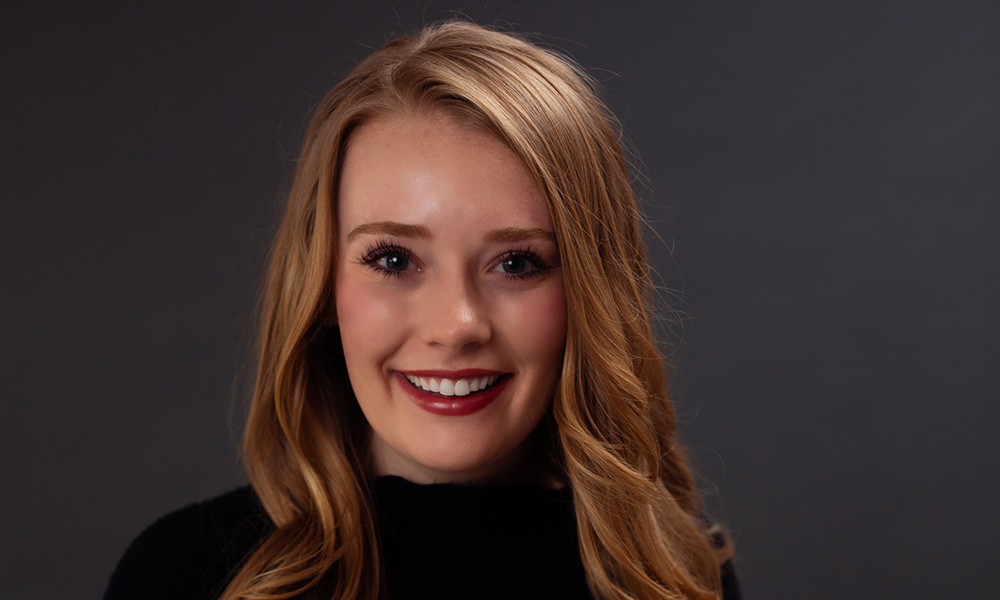Mentorship was so pivotal to Emily Schultz’s Denison experience she based her master’s at Oxford on the subject & leads a mentorship program at Google.
Emily Schultz ‘16 credits her success at Google and her master’s degree from Oxford to her love of learning. “I took full advantage of the liberal arts experience,” says Schultz, who majored in educational studies. “At Denison, I took a variety of classes that I really enjoyed. I wish that more people would have the opportunity to take advantage of the wide variety that a school like Denison offers.”
Her experience in the liberal arts led her to Oxford, where she studied abroad during her senior year. When she returned as a graduate student, Schultz pursued her Master of Science in Education, focusing on mentorship in the liberal arts. Her thesis was titled, “A Qualitative Exploration of Professor-Student Mentorship: The Case of the American Liberal Arts.”
Schultz chose this topic because she experienced really strong mentorship, especially among her Denison professors and at the Knowlton Career Center. “I find it most powerful when you set healthy expectations and ask explicitly that potential mentors invest in you. Real mentorship — with healthy relational boundaries between students and professors — can change lives.’
‘Great mentorship is pretty inherent in the ways in which liberal arts schools are structured. Liberal arts colleges, and the students who attend them, have always asserted that mentorship is done well there. I wanted to contribute to the growing body of research with a qualitative study that explored this assertion.”
Schultz finished her masters’ thesis in 2017. Her study confirmed that the guiding values of the liberal arts and a smaller sized higher education institution hold mentorship and interpersonal relations as a top priority. Most importantly, according to the professors and administrators Schultz interviewed, she reported there are distinct qualities which yield strong mentorship and are commonly found at liberal arts institutions. A few of these include the ability to set interpersonal boundaries in mentoring based on professors’ preferences, the prioritization of mentoring held with other important professorial responsibilities, and the formal and informal institutional mechanisms by which mentoring is facilitated.
While at Denison, Schultz found her own mentor, who was such a good fit that she routinely has hour-long phone calls with her to this day, nearly four years after Schultz graduated. Laura Russell, an associate professor of communication, and Schultz both highly regard the other’s friendship to date. “Laura was an incredible support person and friend to me at Denison,” says Schultz. She recounted how Russell was a sounding board for all of her major academic decisions during Undergraduate, including study abroad and selecting a graduate school.
“Real mentorship —with healthy relational boundaries between students and professors—can change lives.”
While Schultz was preparing for her graduate school interview for admission into Oxford, Russell helped her prepare for the interview and even assisted her in booking a room for the big day. “She helped me to prepare pre-interview, and to debrief post-interview. Her support meant the world to me,” says Schultz. “Professor Russell was such a calming presence. She definitely went above and beyond as a mentor during this time for me at Denison, and I know she dedicates herself similarly to other students.”
“Emily has always exuded a passion for learning,” says Russell. “In fact, we initially met simply because she was interested in learning more about leadership and well-being.”
Since their initial introduction, Schultz and Russell recount many positive memories together not only through mentorship but as a professor helping with senior research and an advisor for Schultz’s presidency in Omicron Delta Kappa - a leadership chapter on campus.
“I have had many, many positive experiences while mentoring Emily,” says Russell. “I suppose my most favorites are those in which she inspired me to think differently. I was also excited by her master’s thesis on mentoring. It was a rich qualitative study that implied real-life consequences for relationships between professors and students. I learned tremendously through her research which has since informed the ways I mentor students.”
Schultz currently works at Google as a solutions consultant in Boulder, Colorado. “But I function, more specifically, as a product specialist,” says Schultz. “In other words, I help Google advertisers and their account managers benefit from the full potential of Google’s products by using both my product expertise and understanding of our customers’ needs.”
Schultz recently created an in-house Global Mentorship and Onboarding Program for her team. She used her master’s research to inform the model she pitched. “I believe there is always a way to apply the skills we’ve acquired in college to the present, though you may have to be creative in finding — or building — an opportunity,” says Schultz.
Her experiences at Denison are consistently used at Google. “My background in the field of educational studies ensures I explain Google’s product in a user-friendly, digestible manner,” says Schultz. She also credits her time as a head resident — wherein she managed a team of student resident assistants with the Office of Residential Communities (then Residential Life) — as a driving force to study college students’ experiences at Oxford, and now manage a mentorship program for college and business interns at Google. “I learned so much about management and student mentoring relationships,” says Schultz, “And I wouldn’t trade my time at Denison for the world.”
